Ethical Issue in ICT - Essay
VerifiedAdded on 2021/05/30
|7
|1848
|208
AI Summary
Contribute Materials
Your contribution can guide someone’s learning journey. Share your
documents today.
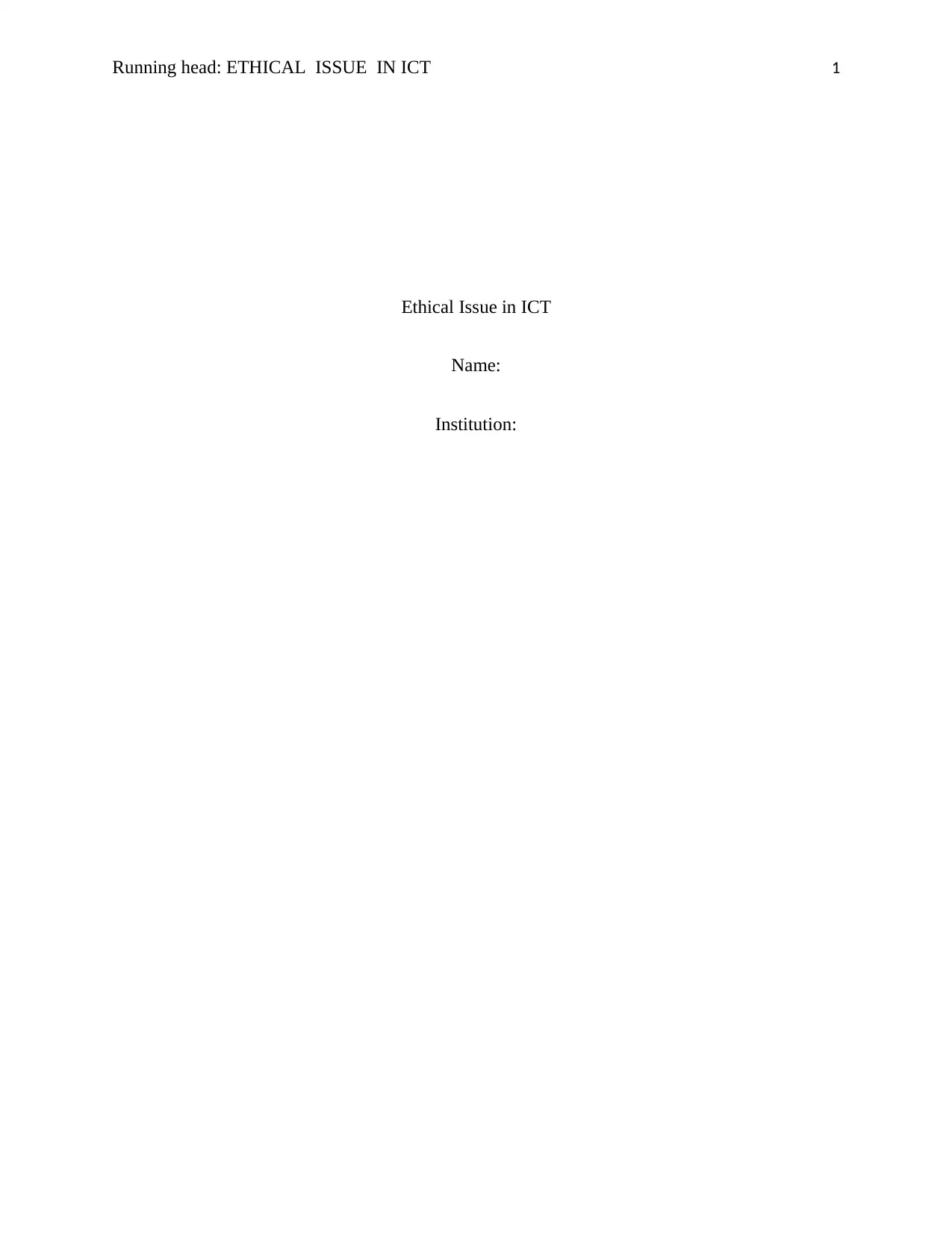
Running head: ETHICAL ISSUE IN ICT 1
Ethical Issue in ICT
Name:
Institution:
Ethical Issue in ICT
Name:
Institution:
Secure Best Marks with AI Grader
Need help grading? Try our AI Grader for instant feedback on your assignments.
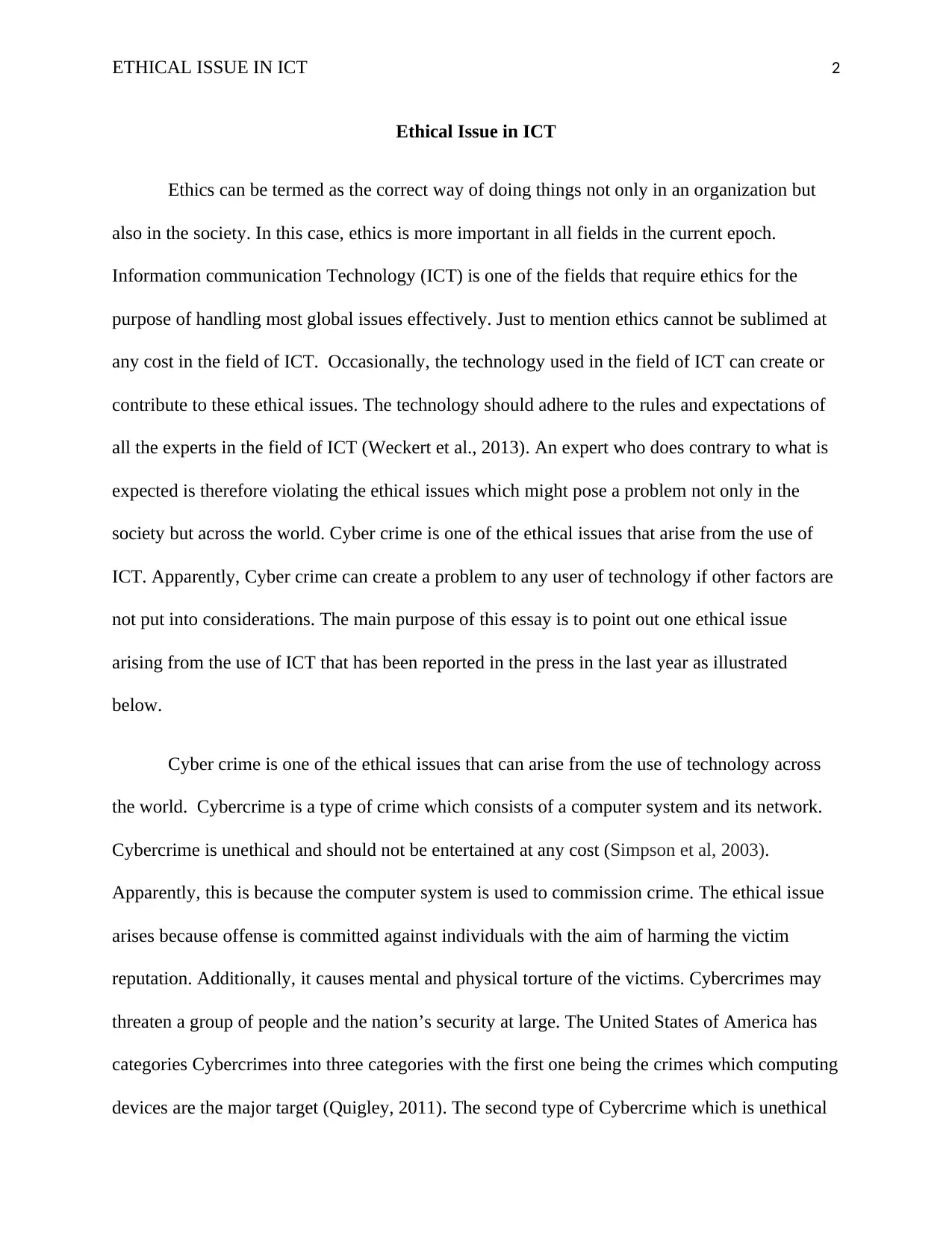
ETHICAL ISSUE IN ICT 2
Ethical Issue in ICT
Ethics can be termed as the correct way of doing things not only in an organization but
also in the society. In this case, ethics is more important in all fields in the current epoch.
Information communication Technology (ICT) is one of the fields that require ethics for the
purpose of handling most global issues effectively. Just to mention ethics cannot be sublimed at
any cost in the field of ICT. Occasionally, the technology used in the field of ICT can create or
contribute to these ethical issues. The technology should adhere to the rules and expectations of
all the experts in the field of ICT (Weckert et al., 2013). An expert who does contrary to what is
expected is therefore violating the ethical issues which might pose a problem not only in the
society but across the world. Cyber crime is one of the ethical issues that arise from the use of
ICT. Apparently, Cyber crime can create a problem to any user of technology if other factors are
not put into considerations. The main purpose of this essay is to point out one ethical issue
arising from the use of ICT that has been reported in the press in the last year as illustrated
below.
Cyber crime is one of the ethical issues that can arise from the use of technology across
the world. Cybercrime is a type of crime which consists of a computer system and its network.
Cybercrime is unethical and should not be entertained at any cost (Simpson et al, 2003).
Apparently, this is because the computer system is used to commission crime. The ethical issue
arises because offense is committed against individuals with the aim of harming the victim
reputation. Additionally, it causes mental and physical torture of the victims. Cybercrimes may
threaten a group of people and the nation’s security at large. The United States of America has
categories Cybercrimes into three categories with the first one being the crimes which computing
devices are the major target (Quigley, 2011). The second type of Cybercrime which is unethical
Ethical Issue in ICT
Ethics can be termed as the correct way of doing things not only in an organization but
also in the society. In this case, ethics is more important in all fields in the current epoch.
Information communication Technology (ICT) is one of the fields that require ethics for the
purpose of handling most global issues effectively. Just to mention ethics cannot be sublimed at
any cost in the field of ICT. Occasionally, the technology used in the field of ICT can create or
contribute to these ethical issues. The technology should adhere to the rules and expectations of
all the experts in the field of ICT (Weckert et al., 2013). An expert who does contrary to what is
expected is therefore violating the ethical issues which might pose a problem not only in the
society but across the world. Cyber crime is one of the ethical issues that arise from the use of
ICT. Apparently, Cyber crime can create a problem to any user of technology if other factors are
not put into considerations. The main purpose of this essay is to point out one ethical issue
arising from the use of ICT that has been reported in the press in the last year as illustrated
below.
Cyber crime is one of the ethical issues that can arise from the use of technology across
the world. Cybercrime is a type of crime which consists of a computer system and its network.
Cybercrime is unethical and should not be entertained at any cost (Simpson et al, 2003).
Apparently, this is because the computer system is used to commission crime. The ethical issue
arises because offense is committed against individuals with the aim of harming the victim
reputation. Additionally, it causes mental and physical torture of the victims. Cybercrimes may
threaten a group of people and the nation’s security at large. The United States of America has
categories Cybercrimes into three categories with the first one being the crimes which computing
devices are the major target (Quigley, 2011). The second type of Cybercrime which is unethical
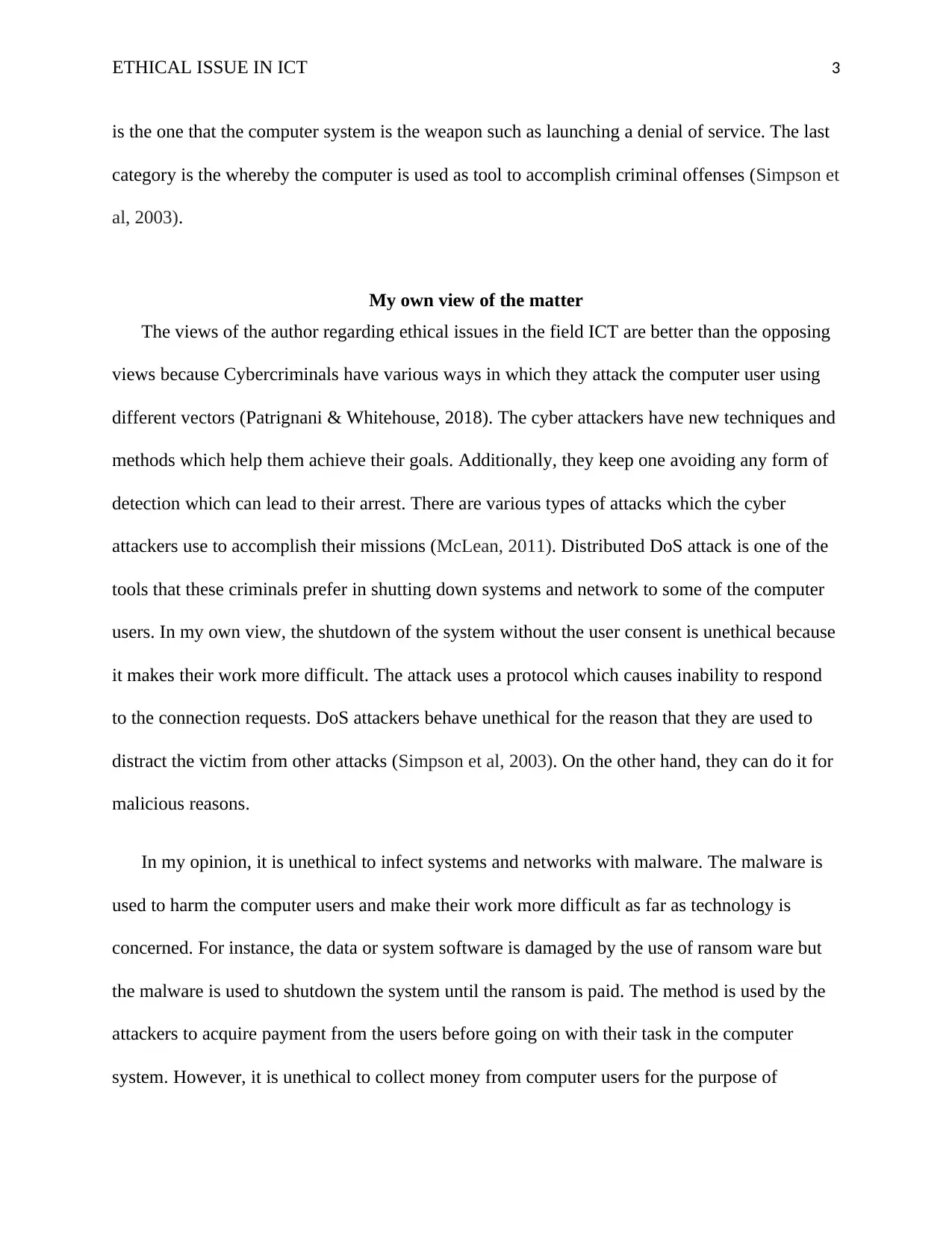
ETHICAL ISSUE IN ICT 3
is the one that the computer system is the weapon such as launching a denial of service. The last
category is the whereby the computer is used as tool to accomplish criminal offenses (Simpson et
al, 2003).
My own view of the matter
The views of the author regarding ethical issues in the field ICT are better than the opposing
views because Cybercriminals have various ways in which they attack the computer user using
different vectors (Patrignani & Whitehouse, 2018). The cyber attackers have new techniques and
methods which help them achieve their goals. Additionally, they keep one avoiding any form of
detection which can lead to their arrest. There are various types of attacks which the cyber
attackers use to accomplish their missions (McLean, 2011). Distributed DoS attack is one of the
tools that these criminals prefer in shutting down systems and network to some of the computer
users. In my own view, the shutdown of the system without the user consent is unethical because
it makes their work more difficult. The attack uses a protocol which causes inability to respond
to the connection requests. DoS attackers behave unethical for the reason that they are used to
distract the victim from other attacks (Simpson et al, 2003). On the other hand, they can do it for
malicious reasons.
In my opinion, it is unethical to infect systems and networks with malware. The malware is
used to harm the computer users and make their work more difficult as far as technology is
concerned. For instance, the data or system software is damaged by the use of ransom ware but
the malware is used to shutdown the system until the ransom is paid. The method is used by the
attackers to acquire payment from the users before going on with their task in the computer
system. However, it is unethical to collect money from computer users for the purpose of
is the one that the computer system is the weapon such as launching a denial of service. The last
category is the whereby the computer is used as tool to accomplish criminal offenses (Simpson et
al, 2003).
My own view of the matter
The views of the author regarding ethical issues in the field ICT are better than the opposing
views because Cybercriminals have various ways in which they attack the computer user using
different vectors (Patrignani & Whitehouse, 2018). The cyber attackers have new techniques and
methods which help them achieve their goals. Additionally, they keep one avoiding any form of
detection which can lead to their arrest. There are various types of attacks which the cyber
attackers use to accomplish their missions (McLean, 2011). Distributed DoS attack is one of the
tools that these criminals prefer in shutting down systems and network to some of the computer
users. In my own view, the shutdown of the system without the user consent is unethical because
it makes their work more difficult. The attack uses a protocol which causes inability to respond
to the connection requests. DoS attackers behave unethical for the reason that they are used to
distract the victim from other attacks (Simpson et al, 2003). On the other hand, they can do it for
malicious reasons.
In my opinion, it is unethical to infect systems and networks with malware. The malware is
used to harm the computer users and make their work more difficult as far as technology is
concerned. For instance, the data or system software is damaged by the use of ransom ware but
the malware is used to shutdown the system until the ransom is paid. The method is used by the
attackers to acquire payment from the users before going on with their task in the computer
system. However, it is unethical to collect money from computer users for the purpose of
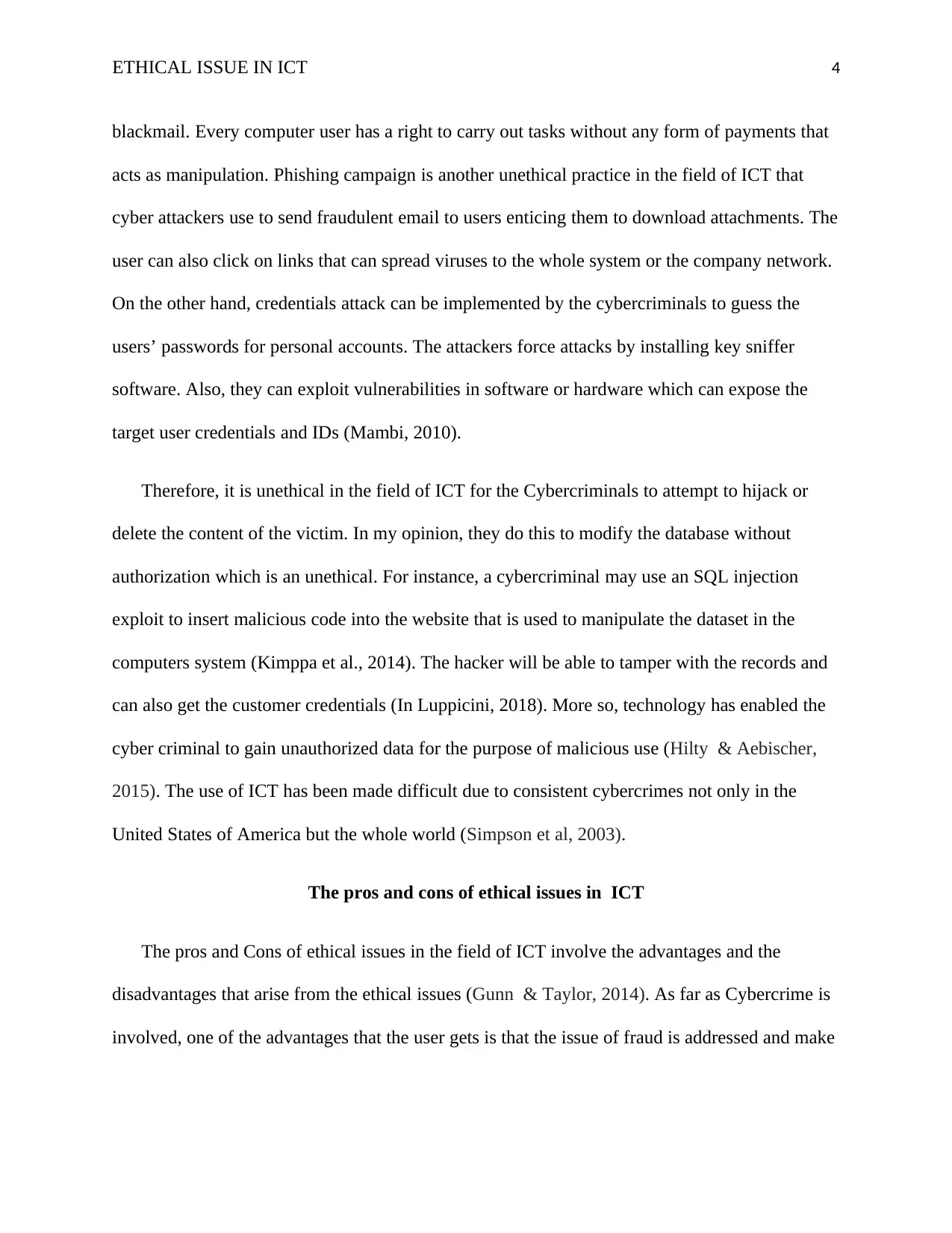
ETHICAL ISSUE IN ICT 4
blackmail. Every computer user has a right to carry out tasks without any form of payments that
acts as manipulation. Phishing campaign is another unethical practice in the field of ICT that
cyber attackers use to send fraudulent email to users enticing them to download attachments. The
user can also click on links that can spread viruses to the whole system or the company network.
On the other hand, credentials attack can be implemented by the cybercriminals to guess the
users’ passwords for personal accounts. The attackers force attacks by installing key sniffer
software. Also, they can exploit vulnerabilities in software or hardware which can expose the
target user credentials and IDs (Mambi, 2010).
Therefore, it is unethical in the field of ICT for the Cybercriminals to attempt to hijack or
delete the content of the victim. In my opinion, they do this to modify the database without
authorization which is an unethical. For instance, a cybercriminal may use an SQL injection
exploit to insert malicious code into the website that is used to manipulate the dataset in the
computers system (Kimppa et al., 2014). The hacker will be able to tamper with the records and
can also get the customer credentials (In Luppicini, 2018). More so, technology has enabled the
cyber criminal to gain unauthorized data for the purpose of malicious use (Hilty & Aebischer,
2015). The use of ICT has been made difficult due to consistent cybercrimes not only in the
United States of America but the whole world (Simpson et al, 2003).
The pros and cons of ethical issues in ICT
The pros and Cons of ethical issues in the field of ICT involve the advantages and the
disadvantages that arise from the ethical issues (Gunn & Taylor, 2014). As far as Cybercrime is
involved, one of the advantages that the user gets is that the issue of fraud is addressed and make
blackmail. Every computer user has a right to carry out tasks without any form of payments that
acts as manipulation. Phishing campaign is another unethical practice in the field of ICT that
cyber attackers use to send fraudulent email to users enticing them to download attachments. The
user can also click on links that can spread viruses to the whole system or the company network.
On the other hand, credentials attack can be implemented by the cybercriminals to guess the
users’ passwords for personal accounts. The attackers force attacks by installing key sniffer
software. Also, they can exploit vulnerabilities in software or hardware which can expose the
target user credentials and IDs (Mambi, 2010).
Therefore, it is unethical in the field of ICT for the Cybercriminals to attempt to hijack or
delete the content of the victim. In my opinion, they do this to modify the database without
authorization which is an unethical. For instance, a cybercriminal may use an SQL injection
exploit to insert malicious code into the website that is used to manipulate the dataset in the
computers system (Kimppa et al., 2014). The hacker will be able to tamper with the records and
can also get the customer credentials (In Luppicini, 2018). More so, technology has enabled the
cyber criminal to gain unauthorized data for the purpose of malicious use (Hilty & Aebischer,
2015). The use of ICT has been made difficult due to consistent cybercrimes not only in the
United States of America but the whole world (Simpson et al, 2003).
The pros and cons of ethical issues in ICT
The pros and Cons of ethical issues in the field of ICT involve the advantages and the
disadvantages that arise from the ethical issues (Gunn & Taylor, 2014). As far as Cybercrime is
involved, one of the advantages that the user gets is that the issue of fraud is addressed and make
Secure Best Marks with AI Grader
Need help grading? Try our AI Grader for instant feedback on your assignments.
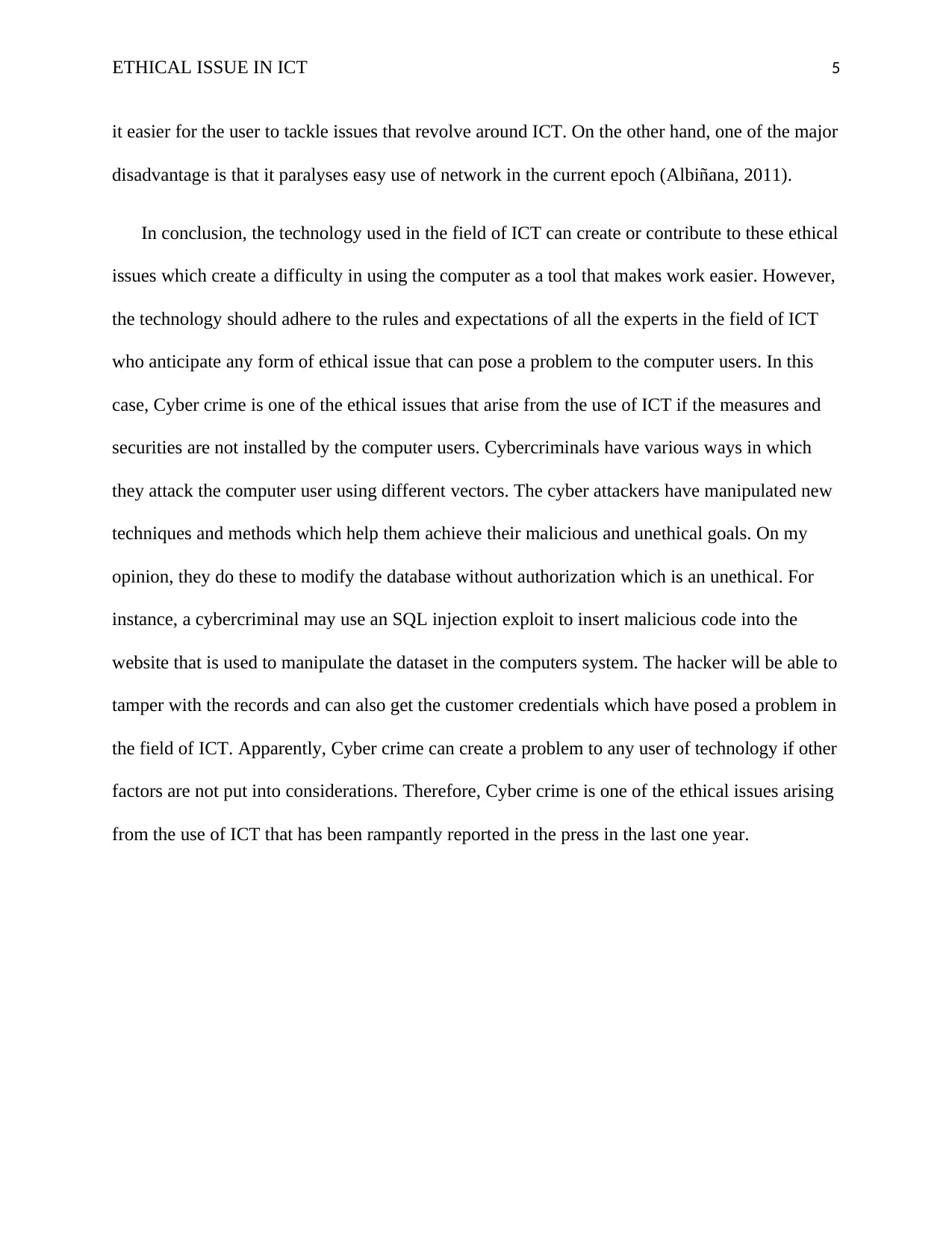
ETHICAL ISSUE IN ICT 5
it easier for the user to tackle issues that revolve around ICT. On the other hand, one of the major
disadvantage is that it paralyses easy use of network in the current epoch (Albiñana, 2011) .
In conclusion, the technology used in the field of ICT can create or contribute to these ethical
issues which create a difficulty in using the computer as a tool that makes work easier. However,
the technology should adhere to the rules and expectations of all the experts in the field of ICT
who anticipate any form of ethical issue that can pose a problem to the computer users. In this
case, Cyber crime is one of the ethical issues that arise from the use of ICT if the measures and
securities are not installed by the computer users. Cybercriminals have various ways in which
they attack the computer user using different vectors. The cyber attackers have manipulated new
techniques and methods which help them achieve their malicious and unethical goals. On my
opinion, they do these to modify the database without authorization which is an unethical. For
instance, a cybercriminal may use an SQL injection exploit to insert malicious code into the
website that is used to manipulate the dataset in the computers system. The hacker will be able to
tamper with the records and can also get the customer credentials which have posed a problem in
the field of ICT. Apparently, Cyber crime can create a problem to any user of technology if other
factors are not put into considerations. Therefore, Cyber crime is one of the ethical issues arising
from the use of ICT that has been rampantly reported in the press in the last one year.
it easier for the user to tackle issues that revolve around ICT. On the other hand, one of the major
disadvantage is that it paralyses easy use of network in the current epoch (Albiñana, 2011) .
In conclusion, the technology used in the field of ICT can create or contribute to these ethical
issues which create a difficulty in using the computer as a tool that makes work easier. However,
the technology should adhere to the rules and expectations of all the experts in the field of ICT
who anticipate any form of ethical issue that can pose a problem to the computer users. In this
case, Cyber crime is one of the ethical issues that arise from the use of ICT if the measures and
securities are not installed by the computer users. Cybercriminals have various ways in which
they attack the computer user using different vectors. The cyber attackers have manipulated new
techniques and methods which help them achieve their malicious and unethical goals. On my
opinion, they do these to modify the database without authorization which is an unethical. For
instance, a cybercriminal may use an SQL injection exploit to insert malicious code into the
website that is used to manipulate the dataset in the computers system. The hacker will be able to
tamper with the records and can also get the customer credentials which have posed a problem in
the field of ICT. Apparently, Cyber crime can create a problem to any user of technology if other
factors are not put into considerations. Therefore, Cyber crime is one of the ethical issues arising
from the use of ICT that has been rampantly reported in the press in the last one year.
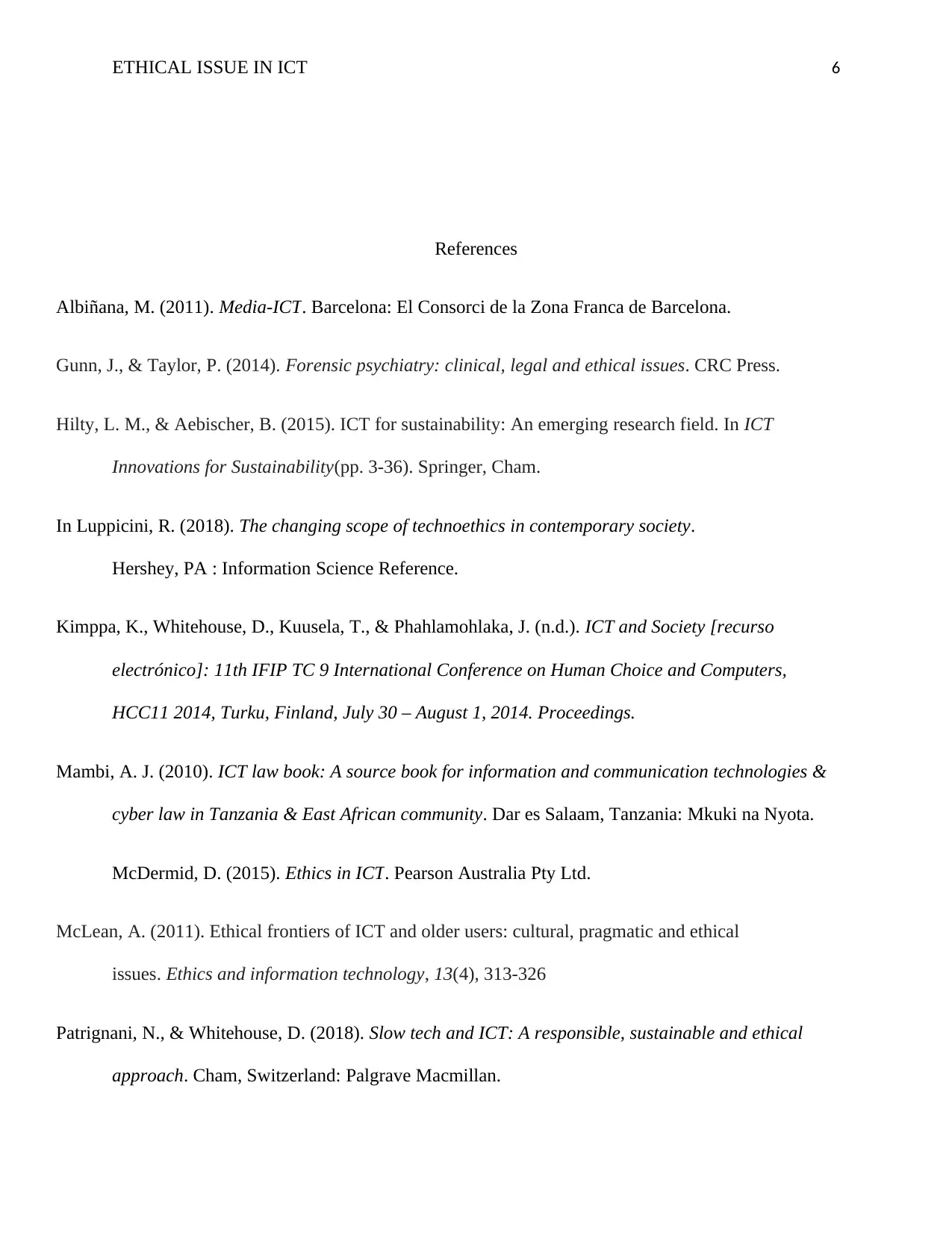
ETHICAL ISSUE IN ICT 6
References
Albiñana, M. (2011). Media-ICT. Barcelona: El Consorci de la Zona Franca de Barcelona.
Gunn, J., & Taylor, P. (2014). Forensic psychiatry: clinical, legal and ethical issues. CRC Press.
Hilty, L. M., & Aebischer, B. (2015). ICT for sustainability: An emerging research field. In ICT
Innovations for Sustainability(pp. 3-36). Springer, Cham.
In Luppicini, R. (2018). The changing scope of technoethics in contemporary society.
Hershey, PA : Information Science Reference.
Kimppa, K., Whitehouse, D., Kuusela, T., & Phahlamohlaka, J. (n.d.). ICT and Society [recurso
electrónico]: 11th IFIP TC 9 International Conference on Human Choice and Computers,
HCC11 2014, Turku, Finland, July 30 – August 1, 2014. Proceedings.
Mambi, A. J. (2010). ICT law book: A source book for information and communication technologies &
cyber law in Tanzania & East African community. Dar es Salaam, Tanzania: Mkuki na Nyota.
McDermid, D. (2015). Ethics in ICT. Pearson Australia Pty Ltd.
McLean, A. (2011). Ethical frontiers of ICT and older users: cultural, pragmatic and ethical
issues. Ethics and information technology, 13(4), 313-326
Patrignani, N., & Whitehouse, D. (2018). Slow tech and ICT: A responsible, sustainable and ethical
approach. Cham, Switzerland: Palgrave Macmillan.
References
Albiñana, M. (2011). Media-ICT. Barcelona: El Consorci de la Zona Franca de Barcelona.
Gunn, J., & Taylor, P. (2014). Forensic psychiatry: clinical, legal and ethical issues. CRC Press.
Hilty, L. M., & Aebischer, B. (2015). ICT for sustainability: An emerging research field. In ICT
Innovations for Sustainability(pp. 3-36). Springer, Cham.
In Luppicini, R. (2018). The changing scope of technoethics in contemporary society.
Hershey, PA : Information Science Reference.
Kimppa, K., Whitehouse, D., Kuusela, T., & Phahlamohlaka, J. (n.d.). ICT and Society [recurso
electrónico]: 11th IFIP TC 9 International Conference on Human Choice and Computers,
HCC11 2014, Turku, Finland, July 30 – August 1, 2014. Proceedings.
Mambi, A. J. (2010). ICT law book: A source book for information and communication technologies &
cyber law in Tanzania & East African community. Dar es Salaam, Tanzania: Mkuki na Nyota.
McDermid, D. (2015). Ethics in ICT. Pearson Australia Pty Ltd.
McLean, A. (2011). Ethical frontiers of ICT and older users: cultural, pragmatic and ethical
issues. Ethics and information technology, 13(4), 313-326
Patrignani, N., & Whitehouse, D. (2018). Slow tech and ICT: A responsible, sustainable and ethical
approach. Cham, Switzerland: Palgrave Macmillan.
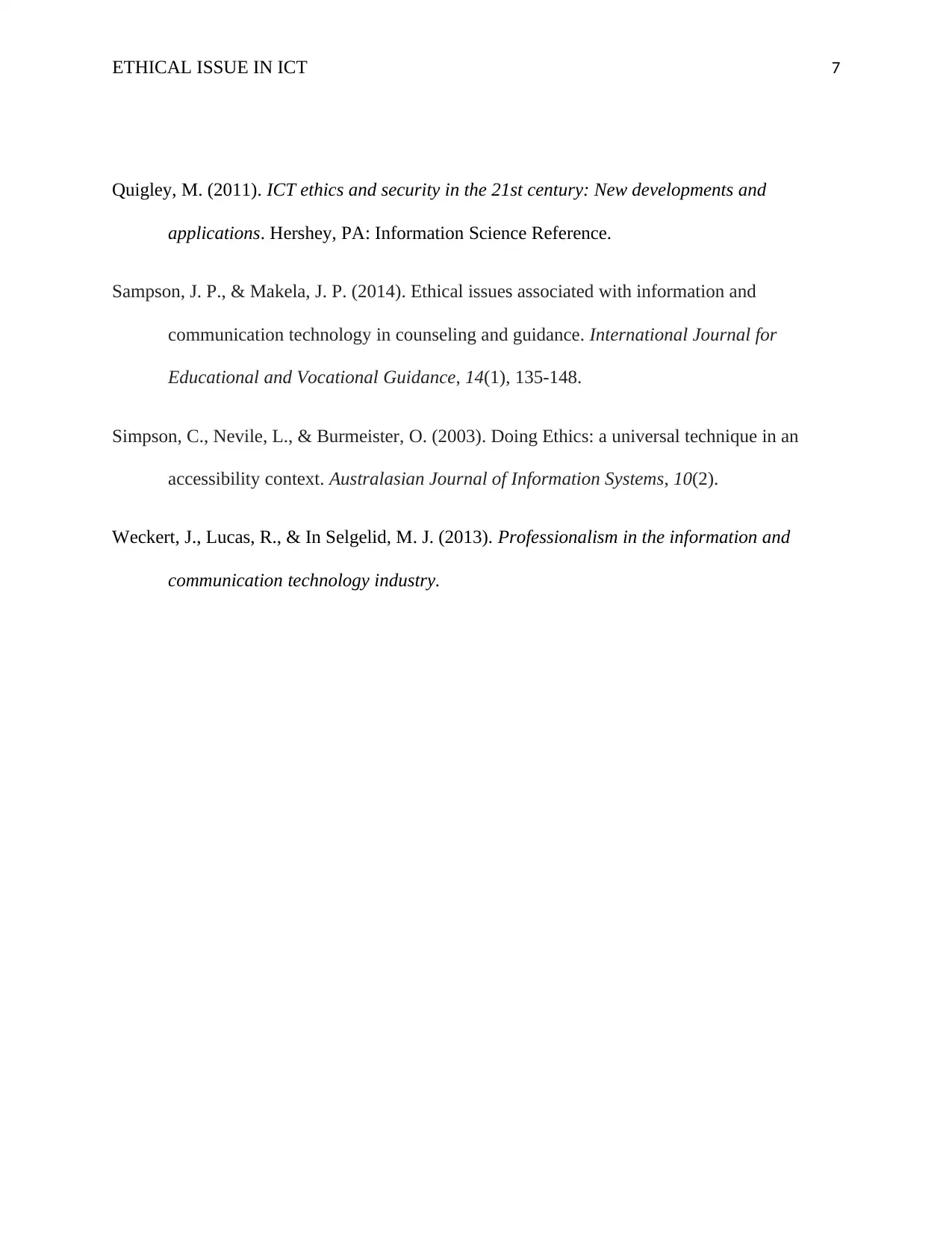
ETHICAL ISSUE IN ICT 7
Quigley, M. (2011). ICT ethics and security in the 21st century: New developments and
applications. Hershey, PA: Information Science Reference.
Sampson, J. P., & Makela, J. P. (2014). Ethical issues associated with information and
communication technology in counseling and guidance. International Journal for
Educational and Vocational Guidance, 14(1), 135-148.
Simpson, C., Nevile, L., & Burmeister, O. (2003). Doing Ethics: a universal technique in an
accessibility context. Australasian Journal of Information Systems, 10(2).
Weckert, J., Lucas, R., & In Selgelid, M. J. (2013). Professionalism in the information and
communication technology industry.
Quigley, M. (2011). ICT ethics and security in the 21st century: New developments and
applications. Hershey, PA: Information Science Reference.
Sampson, J. P., & Makela, J. P. (2014). Ethical issues associated with information and
communication technology in counseling and guidance. International Journal for
Educational and Vocational Guidance, 14(1), 135-148.
Simpson, C., Nevile, L., & Burmeister, O. (2003). Doing Ethics: a universal technique in an
accessibility context. Australasian Journal of Information Systems, 10(2).
Weckert, J., Lucas, R., & In Selgelid, M. J. (2013). Professionalism in the information and
communication technology industry.
1 out of 7
Related Documents
Your All-in-One AI-Powered Toolkit for Academic Success.
+13062052269
info@desklib.com
Available 24*7 on WhatsApp / Email
![[object Object]](/_next/static/media/star-bottom.7253800d.svg)
Unlock your academic potential
© 2024 | Zucol Services PVT LTD | All rights reserved.





